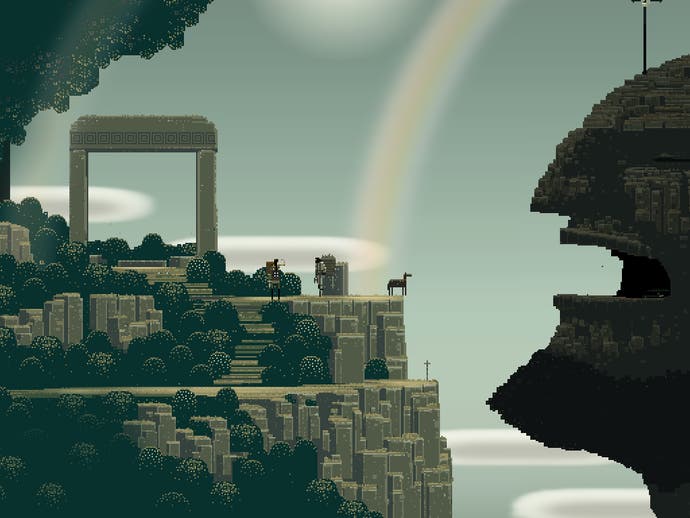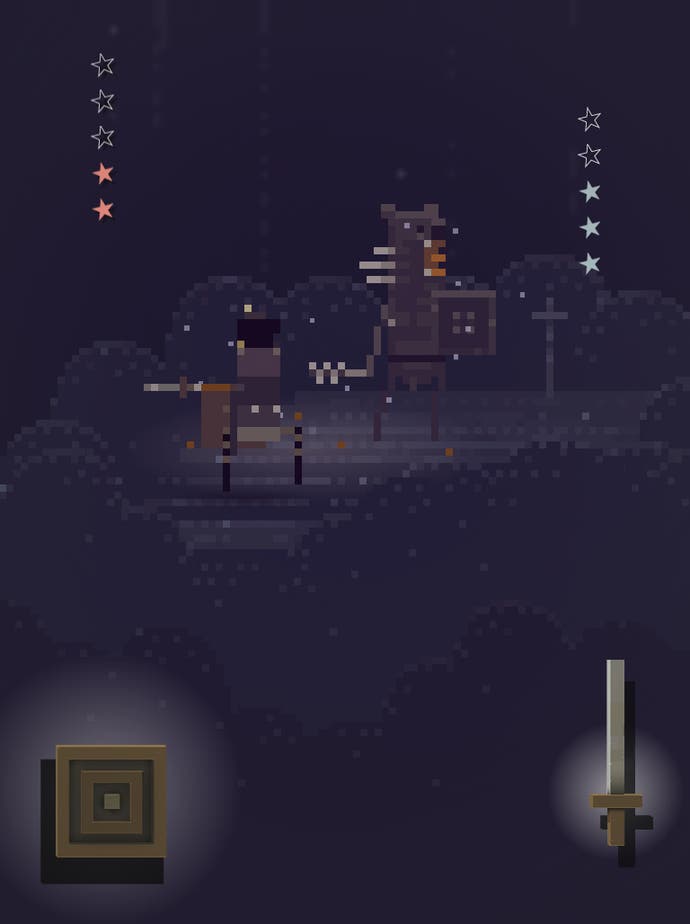Superbrothers: Sword & Sworcery EP
Tell me a stwory.
There's a difference between admiring a piece of art and loving it. Admiration is cerebral. You can evaluate a thing on its merits and talk yourself into admiring it. But love happens. It can be explained, sometimes, but not premeditated. Love creates movement in the soul; admiration stands there and smiles.
Superbrothers: Sword & Sworcery EP is built to be loved, and I admire the hell out of it.
I admire its visual style, a lush, proto-Bohemian echo of King's Quest tableaux from the Apple II era. With brick-like pixels and a palette dominated by muted greens and blues, artist Craig Adams (he's "Superbrothers") hand-crafts the moody forest enclave where the large part of your quest plays out. As a result, the game is filled with scenes that ought to be framed and hung on the wall.
A round of applause is in order, as well, for musician Jim Guthrie, whose soundtrack starts from the game's strongest inspiration – Zelda – and gives the old adventure-anthem genre a more weathered and adult sound. Like Adams and his pixels, Guthrie layers miniature building blocks – short audio loops and esoteric effects – into impressive aural moments.
These perfectly commendable production elements come together in a perfectly commendable work that doesn't quite inspire lasting passion.

The thin fabric uniting Sword & Sworcery's artistic collaboration is a vague quest. You play as The Scythian, a warrior-adventurer who tramps back and forth through the woods, joined on occasion by a few friends, seeking to wield the Megatome of ancient knowledge and awaken spiritual sprites by singing songs of Sworcery.
I could go into more detail, but it's hard to say too much without giving away the whole store, and it wouldn't make much more sense anyway. The premise is purposely ethereal. The specifics of the quest are not of primary concern to Sword & Sworcery; all that really matters is its quest-ness. Literary theorists will love it. Your guide (and possible overlord?) is a cigar-chomping corporate sort named The Archetype, for Pete's sake. The senior thesis practically writes itself.
In any case, don't get too wrapped up in the story. It's a framework, a justification for a world in which the player can explore or even just exist – Sword & Sworcery would be totally fine with that.

There are elements you will recognise as traditional game-y stuff: some low-key puzzles, and a few very simple battles. For the most part, though, you browse at your own pace, preferably a languorous one. It never urges you to push ahead, and in fact encourages you to look around and take a break once in a while. As The Archetype puts it early on, "S:S&S EP does not produce the transcendent experience, it is merely intended to free the nervous system of ordinary patterns."
That's stilted nonsense, of course – it roughly translates as "This is not a transcendent experience, merely a transcendent experience" – but so is everything The Archetype says. I take it to mean that the game wants to be approached calmly, as a plaything rather than as a challenge to be vanquished.
It sounds like easygoing flower-child stuff. However, Sword & Sworcery isn't quite as chill as it lets on. It has an obsessive side, exerting a subtle yet encroaching pressure on you to freaking relax and enjoy yourself. The saccharine prose, the frequent swells in the music, the infinite cheerful orbs of glowing light – all of it gets poured on thick, as if every tiny detail of this game absolutely must fill your belly with sparkles of childlike wonder, or else something bad will happen, like some baby animals will die, probably.

